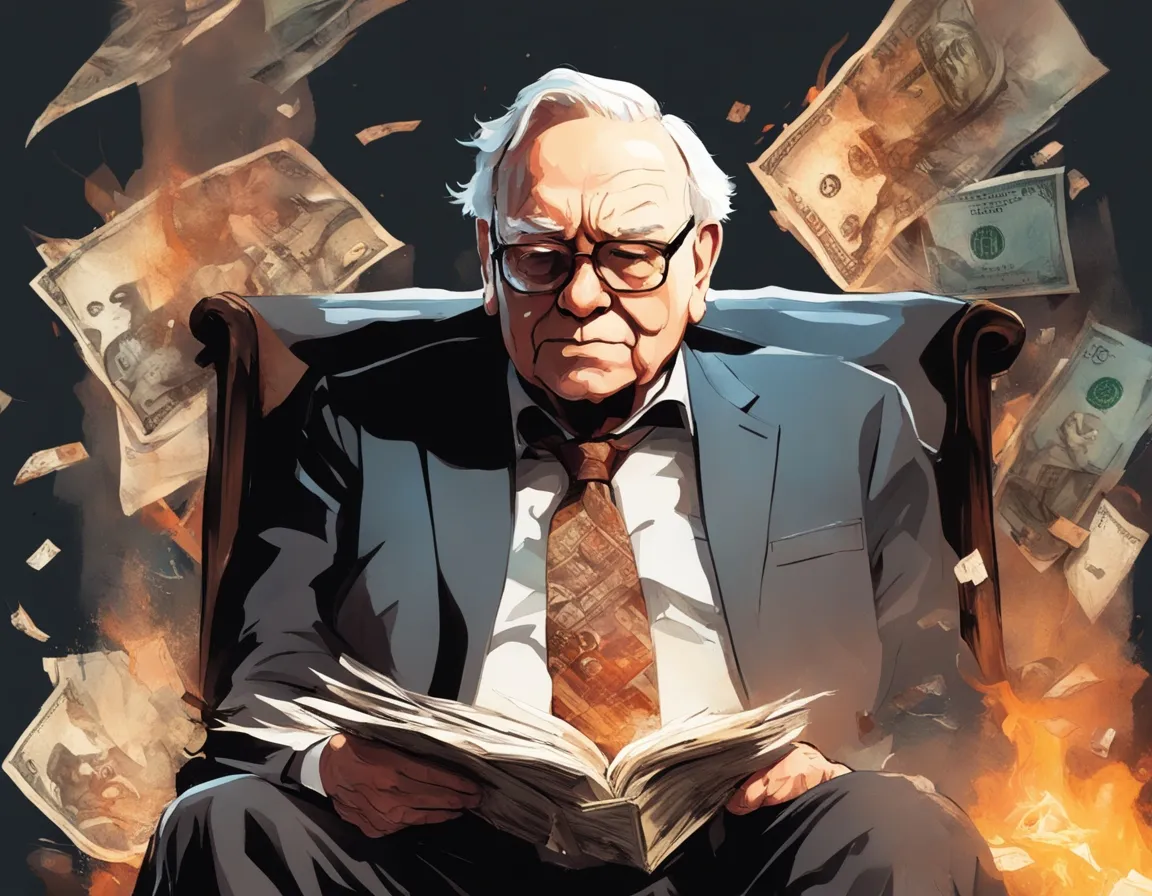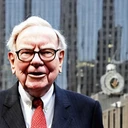Tags: History / Gen Re
This fanpage is not officially affiliated with Berkshire Hathaway: Disclaimer
Embark on a captivating journey through the highs and lows of Berkshire Hathaway's acquisition of General Reinsurance. Discover the impact of this pivotal decision on shareholder value and the resilient recovery that followed. From valuable lessons learned to the future outlook, this article is a must-read for shareholders seeking a comprehensive understanding of Berkshire Hathaway's investment philosophy.

Introduction
In the realm of investment, the term "big mistake" carries a weight that can resonate through the halls of Wall Street and echo in the minds of shareholders for decades. Warren Buffett, the legendary investor and Chairman of Berkshire Hathaway, is renowned for his sage advice and an almost uncanny ability to pick winners in the complex world of finance. However, even the most astute investors are not immune to missteps. One such misjudgment occurred when Berkshire Hathaway acquired General Reinsurance and consequently increased its outstanding shares by a staggering 21.8% 1.
This article aims to dissect the implications of Berkshire Hathaway's pivotal decision to issue additional shares for the acquisition of Gen Re. We will delve into the key figures of the deal and unravel the long-term impact this decision had on Berkshire Hathaway's financial health and shareholder value. As we navigate through this narrative, we will provide shareholders of Berkshire Hathaway with a comprehensive understanding of the historical, political, and economic insights that shaped this event.
Prepare to be engaged in a thorough, interesting, and entertaining journey that will not only highlight a rare blunder by Buffett but also showcase the resilience and strategic recovery of one of the world's most admired companies.
The Acquisition of Gen Re
In 1998, Berkshire Hathaway set its sights on a strategic acquisition that would bolster its already formidable insurance operations: General Reinsurance. The acquisition was executed through a stock deal, where Berkshire issued 272,200 new shares to finance the purchase, valuing General Re at an impressive $15.9 billion 2. At the time, this move was seen as a masterstroke to enhance Berkshire's position in the reinsurance market.
The decision to use stock rather than cash was a departure from Buffett's usual preference for cash deals. This choice was later reflected upon with regret, as Buffett famously quipped he would "rather prep for a colonoscopy than issue Berkshire shares" 2. The immediate reaction from the market and shareholders was mixed, with some expressing concern over the dilution of their shares.
The acquisition seemed to align with Berkshire's business model, which included building its insurance operation and acquiring diversified non-insurance businesses. However, it also set the stage for Buffett's future aversion to stock deals, reinforcing his belief in the value of using internally generated cash for acquisitions.
Gen Re's role within Berkshire Hathaway's portfolio was significant. As a multinational reinsurance company with a strong network and superior financial strength ratings, Gen Re brought a wealth of experience and stability to the table 3.
The Financial Impact
The financial impact of the Gen Re acquisition was felt most acutely in 2001 when Berkshire Hathaway realized $800 million in losses from its new subsidiary 1. These losses were a result of various economic conditions and market factors, including a downturn in the reinsurance industry and the aftermath of the dot-com bubble burst.
The increase in outstanding shares by nearly 22% had a profound effect on shareholder equity. Not only did it dilute the value of existing shares, but it also meant that the shares issued to General Re's former shareholders, which were worth $15.9 billion in 1998, ballooned to a value of $148 billion by 2023 6. This represented a significant opportunity cost for Berkshire Hathaway and its shareholders.
| Year | Event | Share Value |
|---|---|---|
| 1998 | Acquisition price of Gen Re | $15.9 billion |
| 2023 | Value of issued shares for Gen Re | $148 billion |

Buffett's admission of the mistake was a candid reflection on the deal. He acknowledged that Berkshire shareholders gave far more than they received, a rare misjudgment for the Oracle of Omaha 1. This experience taught Buffett a valuable lesson: to double-check the numbers and use cash whenever possible for acquisitions, a strategy that has since been woven into the fabric of Berkshire Hathaway's investment philosophy.
The lessons learned from the Gen Re acquisition have since influenced Berkshire Hathaway's future investment strategies, steering the company towards a more cautious approach to stock issuances and a reinforced commitment to cash deals. This strategic pivot has helped Berkshire maintain its financial strength and continue to deliver value to its shareholders.
Gen Re's Role in Berkshire's Portfolio
General Reinsurance Corporation, commonly known as Gen Re, has a storied history dating back to its inception in 1921 as General Casualty and Surety Reinsurance Corporation 3. As a direct reinsurer with a vast network spanning over 40 offices worldwide, Gen Re has become an integral component of Berkshire Hathaway's insurance operations. Its financial strength is underscored by superior ratings from major agencies: A.M. Best rates it A++ (Superior), Standard & Poor's at AA+, and Moody's at Aa1 3. These ratings are not just accolades; they represent the company's robust financial health and its ability to fulfill its obligations, which is paramount in the world of reinsurance where risk is omnipresent.
The financial stability of Gen Re is further highlighted by its impressive capital and net premiums written, which stand at $15.8 billion and $11.5 billion, respectively 4. This financial footing enables Gen Re to make a straightforward yet profound promise: "We only make promises we can keep" 4. This ethos aligns seamlessly with Berkshire Hathaway's reputation for reliability and fiscal prudence.
Beyond its financial contributions, Gen Re brings strategic benefits to Berkshire Hathaway. As a reinsurance company, it provides a buffer against the volatility inherent in direct insurance operations by diversifying risk. This synergy enhances the overall stability of Berkshire's insurance segment, which is a cornerstone of its business model.
In summary, Gen Re's role in Berkshire Hathaway's portfolio is multifaceted. It is not just a subsidiary; it is a testament to the conglomerate's commitment to financial strength, strategic business operations, and an unwavering promise of dependability.
The Aftermath and Recovery
The acquisition of Gen Re was not without its challenges. Initially, the deal led to an $800 million loss in 2001 and an increase in outstanding shares by 21.8%, diluting shareholder value 1. The aftermath required decisive action from Berkshire Hathaway to mitigate these negative impacts ↗. This involved changes in management and business practices at Gen Re, as well as addressing regulatory challenges, such as the securities fraud investigation involving Gen Re's subsidiary, Cologne Re Dublin 3.
In the years following the acquisition, Gen Re underwent a significant transformation. The integration into the Berkshire Hathaway family necessitated a cultural shift and an alignment of operational practices. One of the most important changes was the move towards using internally generated cash for acquisitions, reflecting a more cautious approach post-Gen Re acquisition. This shift is exemplified by Berkshire's $130 billion cash stockpile by 2023 ↗.
Warren Buffett's investment philosophy also evolved from the experience. He famously stated that he would "rather prep for a colonoscopy than issue Berkshire shares," highlighting his aversion to diluting shareholder value through share issuance 2. The Gen Re acquisition was a costly lesson, but it ultimately reinforced the importance of using cash for deals whenever possible.
The recovery of Gen Re is a testament to Berkshire Hathaway's resilience. Key milestones in the company's recovery include the restoration of its financial strength, the successful navigation of regulatory hurdles, and the cultural and operational integration into Berkshire Hathaway ↗ ↗. Gen Re's improved performance over the years has contributed significantly to Berkshire's success, proving that even the most challenging acquisitions can be turned around with the right strategy and leadership.
Gen Re's Centennial and Future Outlook
Gen Re's centennial marked a significant milestone, celebrating 100 years as a professional reinsurer in the U.S. and 175 years of Cologne Re history 5:
The alliance between General Re and Cologne Re in the 1990s, followed by the acquisition by Berkshire Hathaway, established a premier global reinsurance group. This rich history is not just a testament to longevity but to the resilience and innovation that Gen Re continues to bring to the insurance industry.
Under the leadership of Chairman Charlie Shamieh and President and CEO Kara Raiguel, Gen Re looks to the future with a forward-looking perspective. With a presence in 23 countries and a role in all major insurance markets, Gen Re is well-positioned to tackle the challenges of the 21st century 5. The leadership's commitment to innovation and adaptation is encapsulated in their vision for the company's future.
Gen Re's thought leadership is also evident through its Gen Re Perspective platform, which offers blogs, articles, and videos to engage with the company's topics and experts 5. This resource demonstrates the company's dedication to staying at the forefront of industry knowledge and sharing its expertise with a broader audience.
Looking ahead, the reinsurance industry faces both challenges and opportunities. Climate change, technological advancements, and evolving risk landscapes are just a few factors that will shape the industry. Gen Re's strategic moves within the Berkshire Hathaway conglomerate will likely focus on growth areas such as cyber insurance, life and health reinsurance, and leveraging data analytics to better understand and price risks.
Gen Re's role in Berkshire Hathaway's portfolio has evolved from a costly mistake to a cornerstone of strength and stability. The aftermath and recovery of the Gen Re acquisition have provided valuable lessons in management and investment philosophy. As Gen Re celebrates its centennial and looks to the future, it stands as a beacon of innovation and resilience, poised to navigate the complexities of the reinsurance industry in the years to come.
Conclusion
As we reflect on the narrative of Berkshire Hathaway's acquisition of General Reinsurance and its subsequent journey, it is clear that even the most astute investors are not immune to missteps. The issuance of 272,200 Berkshire shares to purchase Gen Re, which increased the company's outstanding shares by 21.8% and was later described by Warren Buffett as a "terrible mistake" 1, stands as a testament to the complexity and unpredictability inherent in the world of finance. The initial $800 million loss in 2001 1 and the realization that the shares issued were worth $148 billion in 2023 2 underscore the magnitude of this oversight.
However, the Gen Re acquisition also highlights the resilience and strategic acumen of Berkshire Hathaway. Despite the initial financial impact, Gen Re has become a cornerstone in Berkshire's portfolio, contributing to its robust insurance operations and overall business model. The company's superior financial strength ratings and global presence 34 have solidified its position as a leading reinsurance entity, and its centennial celebration 5 reminds us of the long-term value it brings to Berkshire Hathaway.
Warren Buffett's candidness in admitting to this mistake is not only a display of transparency but also an important lesson in humility and the pursuit of continuous improvement. It is this openness and willingness to learn from errors that have fostered deep trust among Berkshire's shareholders. Buffett's advice to use cash for acquisitions whenever possible 2 and his humorous preference for a colonoscopy over issuing Berkshire shares 2 are indicative of his evolved approach to business decisions.
The story of Gen Re within Berkshire Hathaway's portfolio is not merely about recovery from a misjudgment; it is about the enduring strength of a company that can adapt and thrive post-adversity. It serves as a reminder that mistakes, while costly at times, are integral to the investment process and can be the catalysts for growth and wisdom.
In closing, let us look to the future with optimism. With Gen Re as a key component of its success and an $130 billion stockpile of cash as of 2023 ↗, Berkshire Hathaway is well-positioned to continue its legacy of excellence. The company's ability to bounce back from its "big mistake" with Gen Re is a powerful reminder of the enduring nature of our investment philosophy. Here's to the next chapter of Berkshire Hathaway, with Gen Re's pioneering spirit and expertise helping to chart a prosperous course.
References
-
Warren Buffett’s failures: 15 investing mistakes he regrets - www.cnbc.com ↩↩↩↩↩↩
-
Warren Buffett's $69.6 Billion Mistake -- And What He Learned From It | The Motley Fool - www.fool.com ↩↩↩↩↩↩
-
Financial Information - www.genre.com ↩↩↩
-
Celebrating a Lifetime of Reinsurance Relationships - knowledge.genre.com ↩↩↩↩
-
Following Berkshire Hathaway Inc. (BRK-A), one Class A share is approximately $543k as of December 29th 2023. That means 272,200 Class A shares are worth about $148bn. ↩












